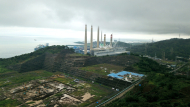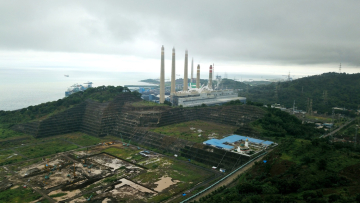
Company – Target
This profile is a priority campaign targetBankTrack
Camilla Perotti, Banks and Coal Campaigner at BankTrack

Company – Target
This profile is a priority campaign targetBankTrack
Camilla Perotti, Banks and Coal Campaigner at BankTrack
Why this profile?
Perusahaan Listrik Negara (PLN or PT PLN) is the state-owned Indonesian utility, and is actively developing fossil fuel projects across Indonesia, including massive coal- and gas-fired power plant projects. PLN was also the recipient of a large loan from the Asian Development Bank.
What must happen
Banks should exclude corporate financing (including both lending and underwriting) to PLN until it ends expansion of coal-fired power capacity and presents a plan for closing all coal assets by 2040. As the IEEFA observes, Japanese (Mizuho, MUFG, SMBC) and Chinese banks, and public financial institutions like Korea, Japan and China’s export-import banks, have been the key financiers of PLN’s coal ventures.
PLN must rapidly replace coal- and gas-fired plants with renewable sources to be Paris-aligned, according to the Climate Action Tracker and the IEA's Indonesia net zero roadmap. Climate finance, specifically Indonesia’s Just Energy Transition Partnership (see below), is crucial to this decommission and retirement process.
| Sectors | Electric Power Distribution , Coal Electric Power Generation |
| Headquarters |
|
| Ownership |
PLN is completely controlled by the Indonesian state (100% equity). |
| Subsidiaries |
|
| Website | https://web.pln.co.id/en/about-us/company-profile |
PLN accounts for 60% (43GW) of Indonesia’s total power generation capacity of 74GW. 60% of Indonesia's entire energy mix is generated by coal-fired thermal power.
PLN’s crucial RUPTL (Electricity Supply Business Plan) presents its plans for 2021-2030. The company has a target to make up 25% of its generation capacity with renewable sources by 2025 and a commitment not to invest in any more coal after developing projects currently planned (following President Jokowi's announcement of 2021 to cancel all coal-fired power beyond the existing pipeline). Finally, PLN committed at COP26 in Glasgow to the Global Coal to Clean Power Transition, which involves a pledge to phase-out coal by the 2040s or sooner. However, all of PLN’s plans above do not in fact go far enough in facilitating Indonesia's deep and rapid emissions reductions in line with a 1.5ºC pathway: the IEEFA has observed that PLN’s pipeline is still significant, as it plans to build 13.8GW of coal-fired power on top of the existing 31.9GW installed coal-power capacity in Indonesia.
PLN also suffers from structural financial pressures akin to those of KEPCO, South Korea's national utility, in that the company experiences revenue problems stemming from low government-regulated tariffs as well as low customer debt recovery.
Impact on human rights and communities
PLN's impact on communities via its massive coal and oil facilities is enormous. The emissions and disruption caused by the Suralaya coal plant in the northwest of Banten province (also known as Java units 1 through 10, referring to the individual generation units) is projected to cause almost 5,000 premature deaths and has caused approximately 100,000 cases of acute respiratory disease. See BankTrack's Jawa 9 & 10 profile for fuller details about the projects.
This impact is multiplied across PLN's other large coal plants such as Jambi-1 & 2 and Cirebon.
Impact on climate
Coal and gas are integral to PLN's 10-year plan. While PLN aims to increase the renewable portion of its generation capacity to 25% by 2025, the company plans to finish developing 20GW of coal power capacity that it has in the pipeline, equivalent to ten times the capacity of Java 9 & 10, the two planned units which are an extension of the aforementioned Suralaya plant extension.
As well as Java 9 & 10, PLN is the developer, contractor or a major equity stakeholder in the Java units 1 - 8 at the Suralaya plant, Kaltim-4, Jambi 1, Barru, Asam-Asam and South Sumatra 1 coal-fired power plants, to name just a selection, as well as numerous gas-fired plants. Having the monopoly on Indonesia's electricity generation, the relative proportion of fossil fuels in PLN's electricity generation mix has a significant impact on Indonesia's ability to reduce its emissions in line with a 1.5ºC pathway. The country's failure to implement policies to adequately reduce its emissions is closely linked to PLN's policies, as the state electricity monopoly. The share of unabated coal power in the country's energy mix means that Indonesia's current energy policy is "highly insufficient" regarding alignment with the Paris goal of limiting global temperature rise to 1.5ºC.
International investment in Indonesia's energy transition via PLN Indonesia has signed a Just Energy Transition Partnership (JETP) with a number of international partners, including the US, the European Commission and a group of European countries. PLN will be instrumental in the implementation of the JETP, which itself will be an important benchmark of the success of this new climate finance initiative.
JETPs are a nascent form of climate finance whereby a coalition of countries and public finance institutions are aiming to accelerate a few other countries' net zero transitions through technical and financial support. South Africa's JETP was the first announced, in 2021, and a second tranche including Indonesia, India, Vietnam and Senegal later followed. Indonesia's JETP focuses on renewable energy investments and the accelerated decommissioning of coal power plants. However, analysis of the JETP confirms that the net zero deadlines and renewable energy commitments (at least in the initial statement) failed to be consistent with the Paris Agreement 1.5ºC goal. Ember, an energy think-tank, has cited a range of ways in which the JETP could be strengthened to exclude coal and increase its climate credentials.
Other impacts
Increasing corruption The Indonesian power sector and its leaders, including the state utility PLN responsible for the Java 9 & 10 project, have been the subject of repeated corruption investigations and indictments in recent years. In May 2019, Hyundai Engineering & Construction admitted to bribing an Indonesian politician in order to win the contract for the Cirebon coal power plant in west Java, leading to several arrests. Hyundai E&C won that contract. The contract for the now-shelved Riau-1 plant on the island of Sumatra, meanwhile, was won by Chinese and Indonesian firms, in a case that led to the arrest of multiple national politicians and the trial of the ex-head of the PLN utility. In summary, PLN as the state monopoly utility has been the vehicle for corruption and graft flowing from fossil fuel resources.
Asian Development Bank loan PLN was the recipient of a large loan in 2021 from the Asian Development Bank which exposes the ADB to PLN's significant coal investments, counter to the ADB's sustainability commitments. ADB has coal exclusion policy forbidding its lending to be used for new coal projects, but ADB extended a US $600m loan to PLN at the end of 2021 which, according to the loan agreement, can be used by PLN for anything in its 10-year plan, which includes significant coal power development.
PLN is entirely owned by the Indonesian state, which holds 100% of PLN's shares. According to the Banking on Climate Chaos report, between 2016 and 2023 commercial banks provided more than USD 9 billion in finance to PLN. See PLN's financiers below.






